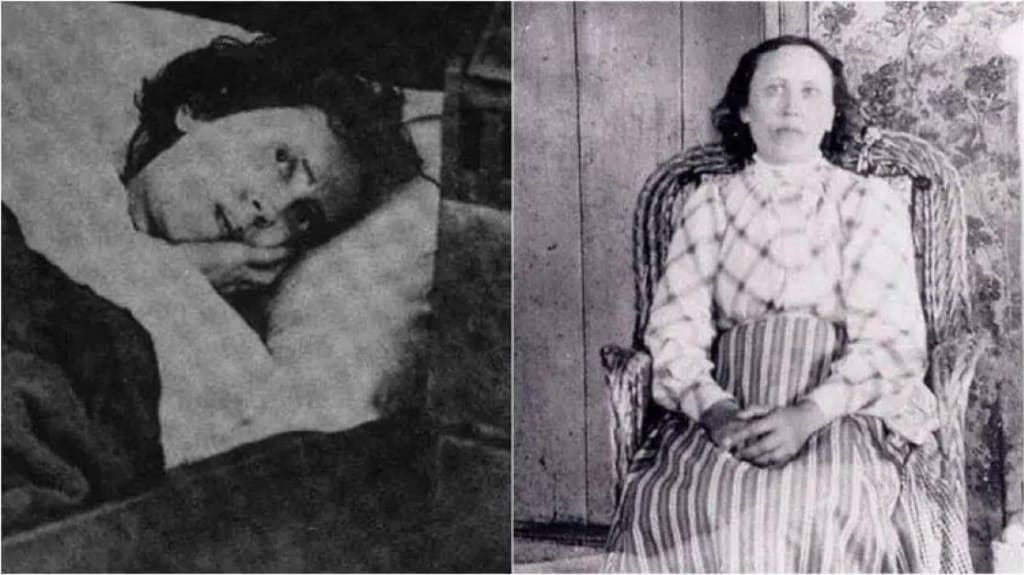The Astonishing Tale of Karolina Olsson: The Woman Who Slept for 32 Years
Sleeping For Long

In the story of medical history, few cases are as mystifying and extraordinary as that of Karolina Olsson, a Swedish woman who reportedly remained in a state of hibernation for an astonishing 32 years. This remarkable story, spanning from 1876 to 1908, defies conventional understanding of human biology and continues to baffle scientists and historians alike. Olsson's prolonged slumber and her subsequent awakening without any apparent residual symptoms make her case one of the most intriguing medical anomalies ever recorded.
The Incident That Sparked a Mystery
Karolina Olsson was born in 1861 in the small village of Oknö, located on an island in southern Sweden. She was a seemingly ordinary girl until a series of events in February 1876 changed her life forever. At the age of 14, while outdoors, Karolina suffered a head injury. Although the specifics of the injury remain unclear, it was serious enough to be noted by her family. Remarkably, she appeared to recover quickly from the head wound, showing no immediate signs of severe trauma.
However, just a few days later, on February 22nd, Karolina began to complain of a severe toothache. Her family, likely considering it a minor ailment, instructed her to go to bed and rest. This seemingly routine instruction set the stage for an extraordinary medical mystery. Karolina would not awaken from her sleep for 32 years.
A State of Perpetual Sleep
Karolina’s prolonged slumber was not characterized by a coma or complete unconsciousness. Instead, she existed in a peculiar state of hibernation. Reports from the time suggest that she remained in bed, largely immobile and unresponsive, but not entirely devoid of life. Her family dutifully cared for her, feeding her small amounts of milk and sugar water to sustain her body. Despite her prolonged inactivity, Karolina showed no signs of the severe muscle atrophy or bedsores that typically accompany long periods of immobility.
Doctors and local authorities were baffled by Karolina’s condition. Numerous medical professionals examined her over the years, but none could provide a satisfactory explanation. Some speculated that her condition might be psychological rather than physiological, possibly a severe case of hysteria or a form of catatonia. However, these theories did little to clarify the true nature of her condition.
Life in a Changed World
Throughout her 32-year slumber, Karolina’s family remained steadfast in their care for her. They shielded her from external stressors and maintained a consistent routine. The world around her, however, was changing rapidly. Sweden was undergoing significant social and technological transformations, including the advent of electricity, the telephone, and the automobile. When Karolina finally awoke in 1908, she found herself in a world vastly different from the one she had known as a teenager.
Her awakening was as mysterious as her prolonged sleep. One morning, without any apparent trigger, Karolina opened her eyes and began to interact with her surroundings. To the astonishment of her family and the medical community, she displayed no signs of cognitive impairment or physical debilitation. Her speech, motor skills, and memory appeared intact, a phenomenon that remains unexplained to this day.
Medical Explanations and Theories
Over the years, numerous theories have been proposed to explain Karolina Olsson’s extraordinary condition. Some researchers have suggested that she may have experienced a rare form of encephalitis lethargica, a disease that emerged in the early 20th century and caused prolonged periods of sleepiness or stupor. However, this theory is speculative, as there is no definitive evidence linking Karolina’s condition to the disease.
Another possibility is that Karolina’s state of hibernation was induced by a psychological condition, such as severe depression or a dissociative disorder. These conditions can sometimes lead to prolonged states of inactivity and withdrawal from reality. However, the lack of residual symptoms upon her awakening challenges this hypothesis.
The concept of human hibernation, akin to the dormant states observed in certain animals, has also been considered. While humans do not possess the biological mechanisms to enter true hibernation, Karolina’s case raises intriguing questions about the potential for the human body to enter and sustain a prolonged state of low metabolic activity.
The Legacy of Karolina Olsson
Karolina Olsson’s story has left an indelible mark on medical history and continues to captivate the imagination of scientists and laypeople alike. Her case remains one of the longest recorded periods of sleep or hibernation in human history, and her eventual awakening without any apparent long-term effects is a medical marvel.
Karolina lived for another 42 years after her awakening, passing away in 1950 at the age of 88. During her post-sleep years, she led a relatively normal life, though she remained a subject of curiosity and speculation. Her story has been recounted in numerous medical journals, books, and documentaries, each attempting to unravel the mystery of her prolonged slumber.
Conclusion
The case of Karolina Olsson is a testament to the enduring mysteries of the human body and mind. Despite advances in medical science, her 32-year sleep remains an enigma, defying conventional explanations and challenging our understanding of human physiology. Karolina’s story serves as a reminder of the complexities and wonders of the human condition, and the potential for extraordinary occurrences that lie beyond the realm of current scientific comprehension.
As we continue to explore the boundaries of medical knowledge, the tale of Karolina Olsson stands as a fascinating chapter in the history of medical anomalies, inspiring ongoing inquiry and a sense of wonder about the hidden capabilities of the human body.
About the Creator
Enjoyed the story? Support the Creator.
Subscribe for free to receive all their stories in your feed. You could also pledge your support or give them a one-off tip, letting them know you appreciate their work.






Comments
There are no comments for this story
Be the first to respond and start the conversation.